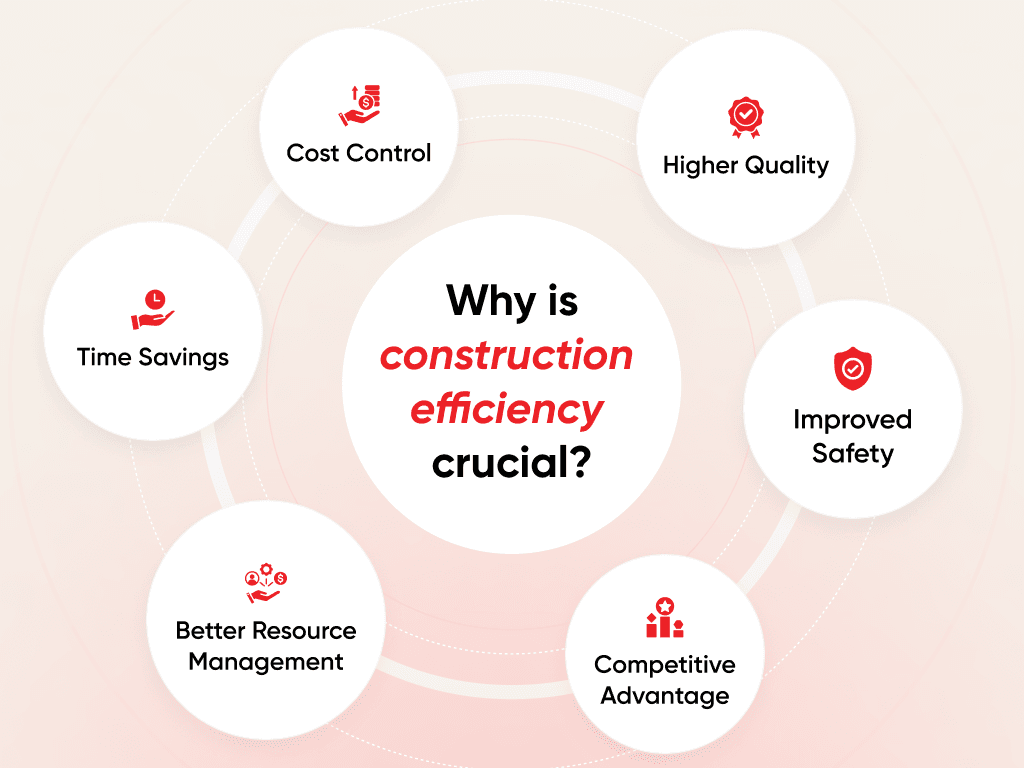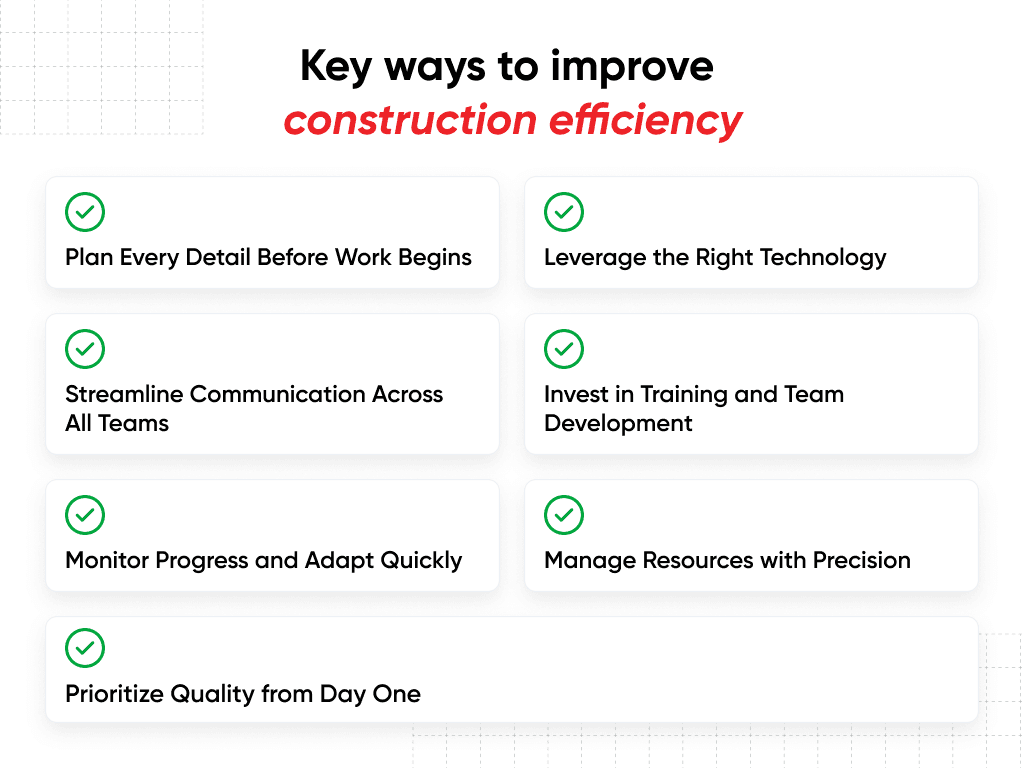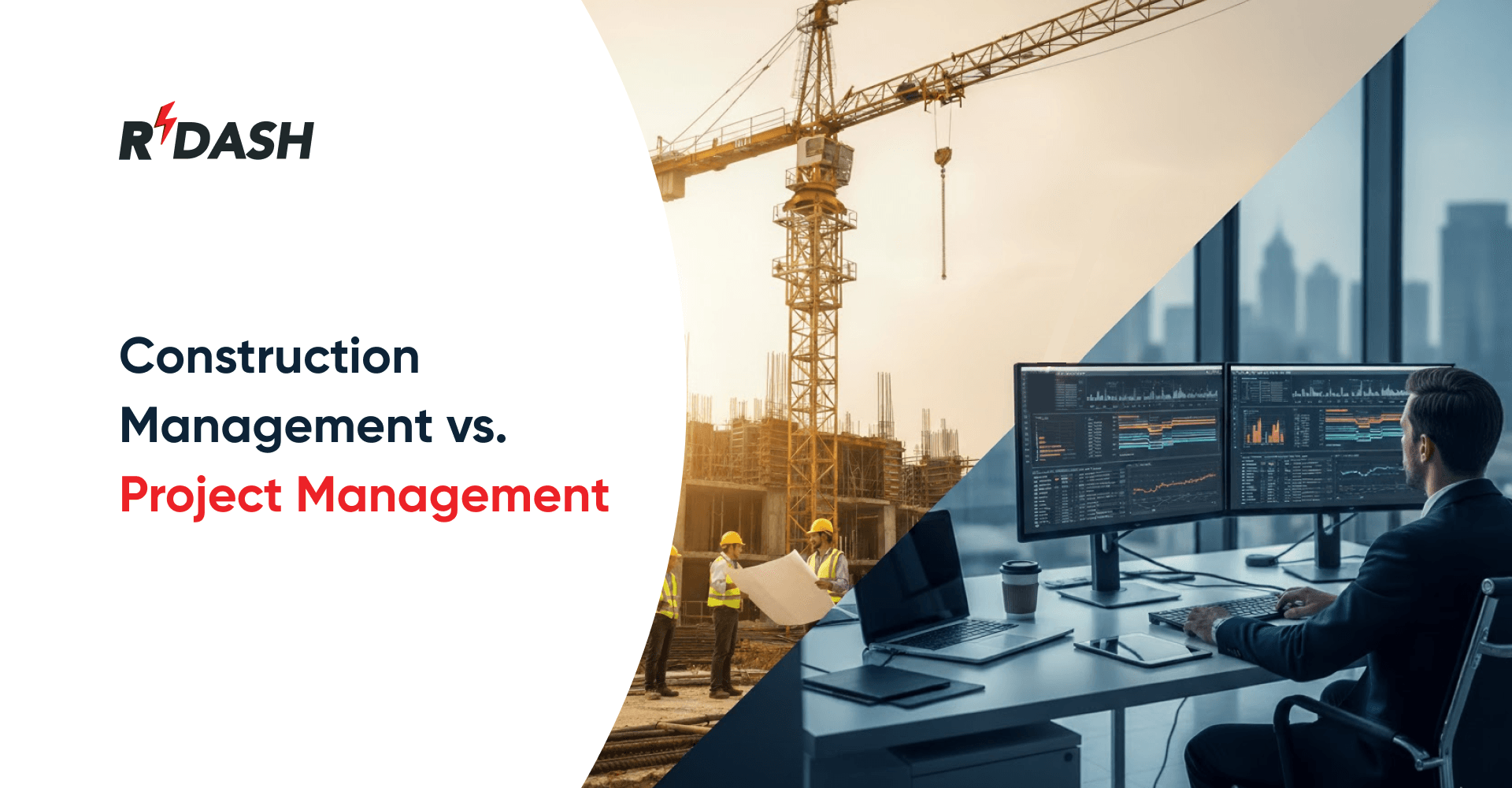What is construction efficiency?
Construction efficiency is the measure of how well labor, materials, equipment, and time are utilized to deliver a project. It aims to achieve the best results while reducing waste and avoiding unnecessary delays. An efficient construction process ensures that every step – from planning and procurement to execution and delivery- is carried out in the best possible way.
Efficiency is not only about speed; it’s about doing the job right the first time. This means using the right tools, skilled workers, accurate planning, and proper coordination between teams. It also involves adopting modern technologies and systems to monitor progress, control costs, and keep quality high.
In simple words, construction efficiency is about delivering projects faster, at lower costs, and with better quality — without cutting corners.
Why is construction efficiency crucial?
Construction efficiency is important because it directly impacts the success and profitability of projects. A well-organized and efficient workflow helps prevent common industry problems such as delays, cost overruns, rework, and safety incidents.

- Cost Control
Efficient construction processes reduce unnecessary expenses caused by material waste, labor inefficiencies, and project delays. By using resources wisely, companies can maintain healthy profit margins while still delivering value to clients. - Time Savings
When teams follow a clear plan and work in sync, projects finish on or ahead of schedule. This allows companies to take on more projects in the same time frame, improving overall productivity. - Higher Quality
Efficiency ensures that every step is done with care and precision. Fewer mistakes mean less rework, which leads to better quality outcomes and satisfied clients. - Better Resource Management
Efficient systems help allocate labor, materials, and equipment where they’re needed most. This prevents shortages, delays, and idle time on-site. - Improved Safety
Organized and well-planned work reduces the likelihood of accidents. An efficient job site has clear processes, safety protocols, and proper supervision in place. - Competitive Advantage
In a competitive market, companies that consistently deliver projects on time, within budget, and to a high standard stand out. This boosts their reputation, leading to more contracts and long-term client relationships.
Key ways to improve construction efficiency
Construction efficiency, in simple terms, it’s about delivering projects on schedule, within the planned budget, and to the highest quality standards. To achieve this, you need a combination of thorough planning, smart technology, skilled people, and smooth coordination between all stakeholders. Let’s look at the main strategies in detail.

1. Plan Every Detail Before Work Begins
A well-structured plan is the foundation of any efficient construction project. This includes defining the project scope, setting realistic deadlines, estimating costs accurately, identifying required resources, and preparing for possible risks.
The more detail you include at this stage, the better you can manage time, labor, and materials later. This reduces the risk of delays, avoids scope changes in the middle of the project, and helps all teams work with clear expectations.
2. Leverage the Right Technology
Today’s construction industry increasingly depends on digital solutions to remain competitive and meet tight deadlines.
Platforms like construction project management software, Building Information Modeling (BIM), and mobile field apps make it possible to monitor progress in real time, track budgets, and manage tasks efficiently. These tools connect the office and the jobsite so that everyone, from project managers to site supervisors, sees the same information instantly. This eliminates outdated spreadsheets and long email threads, replacing them with accurate, real-time updates.
3. Streamline Communication Across All Teams
Poor communication remains one of the leading reasons for project setbacks and expensive errors. Clear communication channels are essential, whether through daily meetings, messaging apps, or centralized dashboards. When workers, subcontractors, architects, and clients receive the same instructions and updates, misunderstandings drop significantly. This means fewer errors, less rework, and faster decision-making.
4. Monitor Progress and Adapt Quickly
Efficient projects are managed proactively, not reactively. Tracking daily progress helps spot small problems before they become big setbacks. If something is slowing down work – like a material delivery delay or an equipment breakdown- quick action can keep the schedule intact. Project managers should regularly review key performance indicators (KPIs) and make adjustments as needed to keep everything moving smoothly.
5. Invest in Training and Team Development
Your workforce is one of your biggest assets. Well-trained, motivated teams work faster, deliver higher-quality results, and maintain safety standards. Regular training sessions on equipment usage, safety procedures, and modern construction techniques can improve productivity significantly. Additionally, recognizing and rewarding good performance helps keep morale high and reduces staff turnover.
6. Manage Resources with Precision
Even the most skilled teams can’t work efficiently without the right materials and equipment at the right time. Poor resource planning often leads to downtime, cost overruns, and frustrated crews.
Implementing a just-in-time delivery system, maintaining equipment regularly, and tracking inventory in real time help avoid shortages, overstocking, and waste.
7. Prioritize Quality from Day One
Rework is among the most costly and time-consuming issues in construction. Prioritizing quality control from the start of the project through to completion helps minimize the chances of work needing to be redone. This involves adhering to design plans, using the right materials, and conducting frequent inspections. Completing a project correctly the first time not only saves money and time but also boosts client satisfaction and strengthens your company’s reputation.
How RDash helps boost construction efficiency
RDash is designed specifically to solve the everyday challenges that slow down construction projects. By combining project management, communication, and reporting in one platform, it keeps your entire team aligned from day one until project handover.
1. Centralized Project Planning and Tracking
RDash allows you to build comprehensive project schedules, allocate tasks, and define clear deadlines – all within a single platform. Everyone from office staff to site teams has access to the same plan, reducing miscommunication and avoiding missed deadlines.
2. Real-Time Progress Updates
RDash connects your site teams directly to your project dashboard. Whether it’s task completion, material updates, or work progress photos, managers can see real-time information without relying on phone calls or scattered reports. This transparency speeds up decision-making and helps fix issues before they cause delays.
3. Improved Communication and Collaboration
Instead of juggling phone calls, WhatsApp chats, and paper notes, RDash keeps all communication in one place. Teams can share updates, approvals, and documents instantly, ensuring everyone works with the latest information.
4. Cost and Budget Control
By linking progress tracking with financial data, RDash gives you a clear view of how costs align with work completed. This helps prevent budget overruns, improves cash flow management, and strengthens profitability.
In short, RDash brings structure, visibility, and control to every stage of construction, helping projects finish faster, at lower cost, and with higher quality.
FAQs
1. How can proper planning improve construction efficiency?
Clear scopes, realistic schedules, and early risk checks reduce surprises, cut rework, and keep crews and materials aligned so work flows without stop‑starts.
2. What are the benefits of using project management software?
It centralizes schedules, tasks, documents, and approvals; gives real‑time progress and cost visibility; and reduces errors from scattered spreadsheets and chats.
3. How does regular progress tracking help avoid delays?
Daily/weekly updates surface bottlenecks – late deliveries, crew gaps, QC issues- early enough to reassign resources or resequence tasks before timelines slip.
4. Can reducing rework really boost efficiency?
Yes. Rework drains time, labor, and materials. Strong QA/QC (checklists, inspections, spec adherence) lowers defects, which shortens schedules and protects margins.






